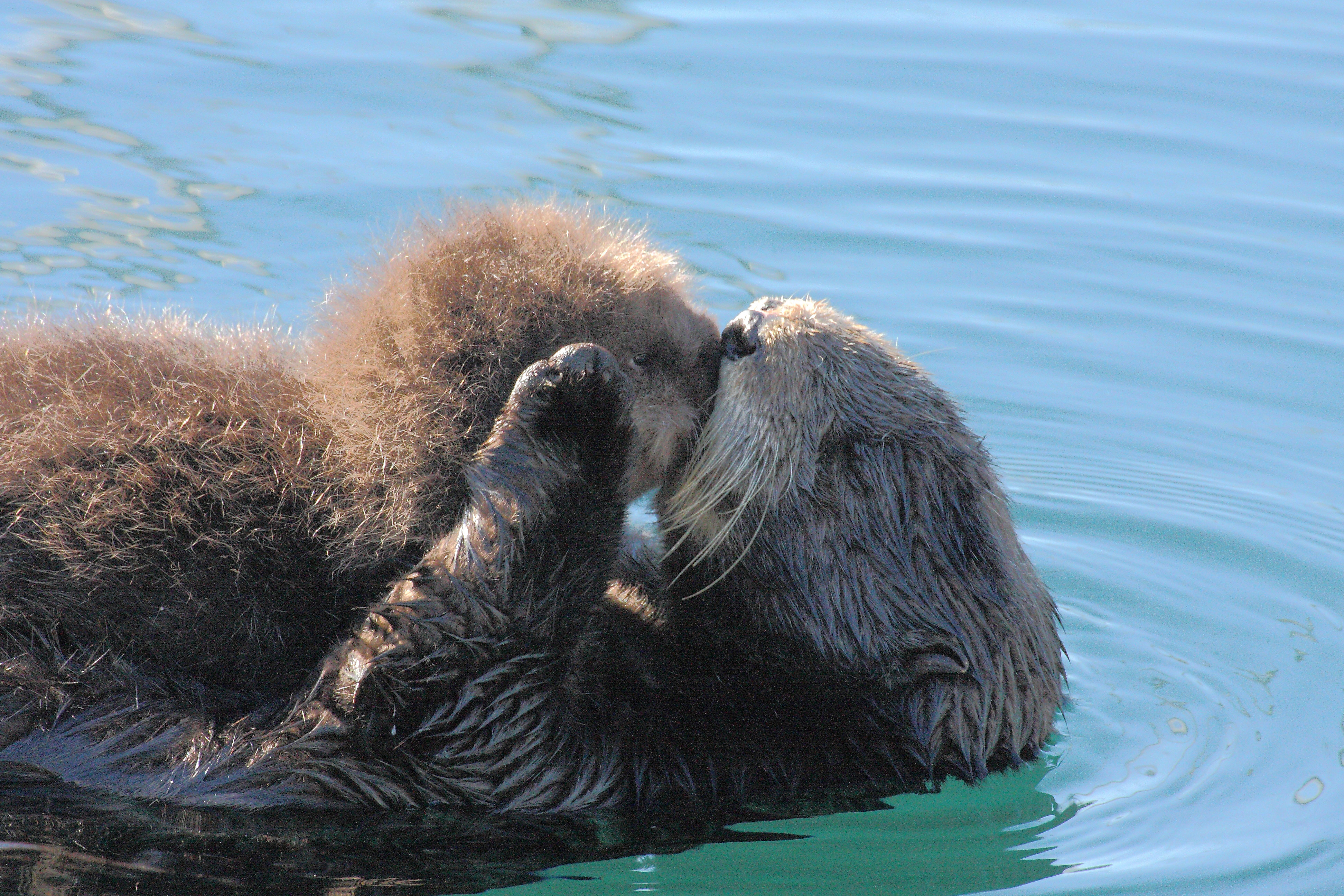What Can Be Done to Protect Sea Otters
Bounding main otters are a keystone species, significant their role in their environment has a greater effect than other species. Every bit top predators, ocean otters are critical to maintaining the balance of nearshore ecosystems, such every bit kelp forests, embayments and estuaries. Without sea otters, body of water urchins tin can overpopulate the bounding main floor and devour the kelp forests that provide cover and nutrient for many other marine animals. By maintaining salubrious kelp forests, ocean otters also indirectly help to reduce levels of atmospheric carbon dioxide, a prevalent greenhouse gas, as kelp absorbs and sequesters carbon.
Hunted to well-nigh extinction in the 18th and 19th centuries, ocean otters finally gained protections with the signing of the International Fur Seal Treaty of 1911. In the 1970s, they received additional safeguarding under the Marine Mammal Protection Act and the Endangered Species Human action. Worldwide, body of water otters have slowly recovered just even so stand far below their historical population numbers. While bounding main otters are vulnerable to natural ecology changes, their populations are significantly impacted by several man factors as well.
Defenders' Impact
In 2006, Defenders of Wild fauna worked with California lawmakers on legislation that established the California Bounding main Otter Fund, a voluntary contribution selection on the state tax forms. The fund pays for important scientific research, public education and law enforcement that benefits bounding main otters.
Defenders helped pass a state law that mandated alert signs on containers of "flushable" kitty litter. This became necessary when researchers discovered that a protozoal parasite from flushed cat feces, Toxoplasma gondii, could laissez passer through wastewater treatment facilities and damage bounding main otters.
We also worked to terminate to the translocation program, which moved sea otters to San Nicolas Isle, and the associated No-Otter Zone.
We supported a bill to stage out the use of drift gillnets in California waters to protect sea otters and many other marine species.
To protect ocean otters that were crossing roads in Moss Landing, CA, Defenders helped brand the case for placing crossing signs and establishing boring speed zones, and we worked with local sea otter protection organizations to install wild animals monitoring cameras.
Finally, we are working with country and federal agencies and other groups to maintain, increase and broaden the current protections for sea otters so they can expand their population along more than of California'due south littoral waters.
Threats
Humans are the biggest threat to ocean otter populations. Direct conflict with humans, through shootings, fishing gear entanglements and boat strikes, have a toll on ocean otters, only oil spills, pollution, disease and loss of kelp pose major threats.
Protection Status
| Endangered Species Act | IUCN Red List | CITES |
| Threatened | Endangered | Appendix I |
What You Can Do
Be sea otter savvy by viewing bounding main otters from a safety altitude and watching out for otters crossing roads. If you alive in California, donate to the California Ocean Otter Fund when you file your taxes.
Facts
Enhydra lutris
Southern sea otters counterbalance 45 to 65 pounds; northern bounding main otters tin can reach up to 100 pounds.
Range/Habitat
Sea otters live in shallow coastal waters in the northern Pacific. In Due north America, there are two distinct sea otter subspecies, the northern ocean otter (Eastward. fifty. kenyoni) and the southern sea otter (E. l. nereis). Northern sea otters are institute in the Aleutian Islands, South Central and Southeast Alaska, British Columbia, and Washington. Southern bounding main otters, likewise called California bounding main otters, alive in waters along the California coastline, ranging from San Mateo Canton in the north to Santa Barbara County in the s.
Population
Historically, sea otters numbered betwixt 150,000 and 300,000 animals throughout the Pacific Rim. The southern sea otter population, which one time numbered about 16,000 animals, is hovering effectually three,000 today.
Beliefs
Sea otters spend much of their lives in the water and can dive up to 330 feet when foraging for food, though about dives are much shallower. They oftentimes remainder in coastal kelp forests, draping the kelp over their bodies to keep from drifting away.
Sea otters are one of the few mammals, other than primates, known to employ tools. They use pocket-size rocks or other objects to pry shellfish from rocks and to hammer them open.
Reproduction
Mating Flavour: Throughout the twelvemonth
Gestation: 6 to viii months
Litter Size: Generally one pup, but sea otters can give birth to twins
Diet
Body of water otters eat urchins, abalone, mussels, clams, crabs, snails and nearly 40 other marine species. Sea otters must eat approximately 25% of their weight in food each day to back up their high metabolism.
prefer a sea otter
Your adoption supports our work to educate people about the need to protect sea otters, continue our efforts to protect sea otters from the threat of oil spills, and aid local communities and the fishing industry live in harmony with these animals.
adopt now
The Extraordinary Sea Otter
News
Image

Bounding main Otter Blog Posts
Publications
Related Regions
Related Issues
Read More About the Ocean Otter
Wildlife and Wild Places
Become Alerts & Updates
Source: https://defenders.org/wildlife/sea-otter
0 Response to "What Can Be Done to Protect Sea Otters"
ارسال یک نظر